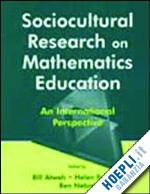Contents: Preface. Part I: Psychological, Social, and Political Perspectives. S. Lerman, A Cultural/Discursive Psychology for Mathematics Teaching and Learning. P. Dowling, Mathematics Education in Late Modernity: Beyond Myths and Fragmentation. O. Skovsmose, P. Valero, Breaking Political Neutrality: The Critical Engagement of Mathematics Education With Democracy. U. Gellert, E. Jablonka, C. Keitel, Mathematical Literacy and Common Sense in Mathematics Education. Part II: Global, Regional, and Local Contexts. B. Atweh, P. Clarkson, Internationalization and Globalization of Mathematics Education: Toward an Agenda for Research/Action. J. Thomas, Globalization and the Politics of Mathematics Education. K.Y. Wong, Z.B.H.M. Taha, P. Veloo, Situated Sociocultural Mathematics Education: Vignettes From Southeast Asian Practices. B. Barton, R. Frank, Mathematical Ideas and Indigenous Languages. R.S. Kitchen, The Sociopolitical Context of Mathematics Education in Guatemala Through the Words and Practices of Two Teachers. Part III: Teachers, Students, and Classrooms. B. Atweh, M.D.A. Ochoa, Continuous In-Service Professional Development of Teachers and School Change: Lessons From Mexico. J. Adler, Resourcing Practice and Equity: A Dual Challenge for Mathematics Education. R. Zevenbergen, Mathematics, Social Class, and Linguistic Capital: An Analysis of Mathematics Classroom Interactions. X. Ma, Longitudinal Evaluation of Mathematics Participation in American Middle and High Schools. L. Ortiz-Franco, W.V. Flores, Sociocultural Considerations and Latino Mathematics Achievement: A Critical Review. V.R. Moody, The Social Constructs of the Mathematical Experiences of African-American Students. Part IV: Numeracy and Everyday Mathematics. B. Johnston, K. Yasukawa, Numeracy: Negotiating the World Through Mathematics. S. Mukhopadhyay, B. Greer, Modeling With Purpose: Mathematics as a Critical Tool. G. Stillman, J. Balatti, Contribution of Ethnomathematics to Mainstream Mathematics Classroom Practice. J.O. Masingila, R. de Silva, Teaching and Learning School Mathematics by Building on Students' Out-of-School Mathematics Practice. Part V: Recent Directions in Gender and Mathematics Education. H. Forgasz, G. Leder, "A+ for Girls, B for Boys": Changing Perspectives on Gender Equity and Mathematics. J.R. Becker, Single-Gender Schooling in the Public Sector in California: Promise and Practice. L. Burton, Fables: The Tortoise? The Hare? The Mathematically Underachieving Male? N. Yelland, Girls, Mathematics, and Technology. J.E. Goodell, L.H. Parker, Creating a Connected, Equitable Mathematics Classroom: Facilitating Gender Equity.











